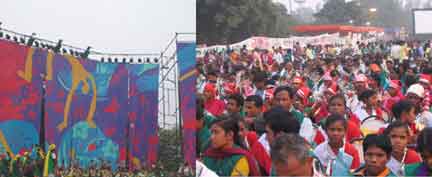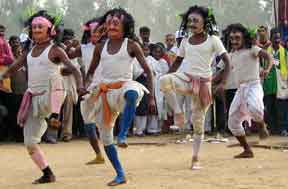 People's Democracy
People's Democracy
(Weekly
Organ of the Communist Party of India (Marxist)
No. 47
November 19, 2006
(Weekly
Organ of the Communist Party of India (Marxist)
|
Vol.
XXX
No. 47 November 19, 2006 |
ANOTHER WORLD IS POSSIBLE
India Social Forum 2006 Concludes Successfully

A view of the inaugural session of the India Social Forum on November 9
S K Pande
JAWAHAR Lal Nehru Stadium, Delhi was virtually inundated with people on the first day of the India Social Forum. We make our way to the media registration center – through dusty streets, full of people on cycles or on foot, competing for space with honking cars, motorcycles, thhela waalas, hens, straydogs and naked poverty stricken children rubbing shoulders with intellectuals artists, street theatre performers, deans and dons and social activists.
Hardly did the programme begin, when thundering applause greeted the news of setback to US president George Bush in both the US Houses, marking a perfect kickstart to the first Indian Social Forum. Setting the tone for the five-day event, speakers at the inaugural session, in their own unique way, reflected the will and spirit of common people to unite and bring about a sea change in the world. A unique feature was an all women inauguration panel for day one.
So, while noted Urdu poet Shahriyar recited some of his couplets so often borrowed by social activists, Ruth Manorama, noted dalit activist and winner of this year’s alternate Nobel Prize, was quick to remind that dalits are the most downtrodden in the country.
There were a variety of messages and speakers, as well as flashbacks on the earlier World Social Forums. The World Social Forum – through debate and popular assembly over the past five years – challenges public opinion with the proposition that ‘another world is possible’. In positing ‘another’, it suggests that the so-called globalisation carries as many problems as it claims solutions, and argues that the neo-liberal formula for progress does not result in development for the common man. In Delhi, it is India Social Forum – chapter of the World Social Forum – which gave a common platform for people from across the country and also some from Asia and Africa to express themselves.
Whether it was the all women’s brigade holding the stage for the inaugural function or the folk dancers from the tribal belts of the country and Africa, the five-day extravaganza that began here on November 9 was an amalgam of culture, fun and frolic with more than a bit of serious thought about pressing issues facing the people. “Building another world: visions for the future”, as the theme suggests, focuses on engendering dialogue, optimism and hope, by creating a space that will enable a greater mobilisation of resources for an alternative future within India, and across the globe.
There was a “cultural team from Africa”, dressed in colorful traditional outfits, seem to be the flavor of the day – at least for the media. The cultural programmes truly highlight the resonance of politics and art. The program list boasts quite a few interesting artists – my pick is Rukma Manganiar, one of the only women singers in a community that “does not endorse” women singing. Rukma continues to sing –– despite having both her legs amputated because of polio. A true inspiration.

A cultural group from Purulia district of West Bengal performing at the ISF
On day one, we got a glimpse of a wide spectrum of cultural diversities. They include cultural programmes on the resonance of politics and art. Nostalgia, a video story of past social forums, Message from Manipur, a video, Poet Shahriyar to read some of his poetry, C J Kuttapan, a folk singer from Kerala, Dr Ramdayal Munda and his troupe from Jharkhand perform a dance with 60 performers using traditional forms in a modern, political rendition, Prahlad Singh Tipaniya & group, singing the words of Kabir and other Nirgun poetry, from Malwa region of Madhya Pradesh and Rukma Manganiar.
The speakers on day one included Wahu Kara, Subhashini Ali, Ruth Manorama, Medha Patkar, Tulsi Mai Munda, and Eileen Kuttab.
The theme for the ISF foregrounds the fact that a positive all embracing vision is inherent in the resistance to imperialist globalisation, and this vision plots out quite a different future for the people of the South, particularly those living in India, Asia and Africa.
The aim of this ISF is to showcase the richly textured vision produced by the wide spectrum of social and political movements in India today, with special emphasis on the role of children, youth and women in taking forward the aspirations of people in struggles against poverty, superstition, racism and exclusion, conservatism and violence against women, huge debt burden and other neo-liberal policies for better healthcare and medication.
Tulsi Mai Munda, a tribal leader of Orissa spoke on the unfulfilled dreams of a better status of women in the independent India. It was Eileen Kuttab, a feminist activist from Palestine, who narrated her experiences while working with the women in her country. Kuttab had been at the forefront of the Palestinian struggle and women’s movement during the days of the first Palestinian Intifada (uprising) in 80s.
FIGHT GLOBALISATION
Social activist Medha Patkar said globalisation had reached every household and the far-flung regions of the country and affected the women worst. “It is a handful of people who are trying to take control of the world. It is a fight against destruction, displacement and injustice,” she added, Wahu Kara, a global social justice campaigner from Kenya, said globalisation amounted to plundering of natural resources.
The forum showcases the vision produced by the wide spectrum of social and political movements in these regions with special focus on the role of children, youth and women in taking forward the aspirations of the people in these countries through various struggles.
In a tide of huge gatherings in Brazil’s Porto Alegre, India’s Mumbai, across Western Europe, and in Caracas, Bamako and Karachi, the Social Forum process builds its case. Assemblies of tens of thousands come together to report that while prescriptions for cost-effective programming may deliver some form of ‘profit’ in pennies diverted from discredited forms of kindness, through shackles imposed on social sector subsidies and may chalk up proud-sounding growth figures, the poor are not climbing out of poverty. Rather the numbers of those adversely affected by structural adjustments are posting an impressive growth.
It is in their name, and in solidarity with their struggles that the World Social Forum (WSF) process exists, carrying forward the quest for more equitable models for change. Pledged to persuading the world away from jobless growth and the mockery of public-private partnerships for social sector disservices, it challenges international institutions as well as national governments and legislatures to revisit their policies, to get their eyes examined for socio-economic myopia. For removed from the complacencies of the fat people who go to Davos and push forward the agenda of the world’s bankers and traders, the WSF multitudes stir the dust of reality and raise the banners of natural justice.
The highlights of the ISF 2006 included discussions on the themes:
Bhopal Gas Tragedy: Experience and Lessons
Our Development, Our Rights
All India People’s Science Network’s manifold themes
Education Assembly: Right to Education – A myth or reality
Transforming Higher Education for People Oriented Development
Cultural Resistance to Globalisation
Intellectual Property Rights: Overarching Issues
Inclusive School Education
Hundreds of people attended these discussion sessions during the Forum. The sale of literature was also impressive with many progressive publishing houses setting up stalls. Another major feature of the Forum was the vibrant cultural performances by various groups from the nook and corner of the country. Many stages set up for these displays, including Safdar Hashmi Manch, witnessed good attendance.
As the Forum concluded with a public meeting on November 13 afternoon, one thing was clear, the event contributed its part to the ongoing fight against globalisation. (INN)